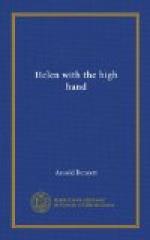There was no other tea in the house. So with a merry heart the callous fellow (shamefully delighting in the imminent downfall of a fellow-creature—and that a woman!) went into the front room as he had been bidden. On one of the family of chairs, in a corner, was a black octagonal case. He opened this case, which was not locked, and drew from it a concertina, all inlaid with mother-of-pearl. Then he went to the desk, and from under a pile of rent books he extracted several pieces of music, and selected one. This selected piece he reared up on the mantelpiece against two brass candlesticks. It was obvious, from the certainty and ease of his movements, that he had the habit of lodging pieces of music against those two brass candlesticks. The music bore the illustrious name of George Frederick Handel.
Then he put on a pair of spectacles which were lying on the mantelpiece, and balanced them on the end of his nose. Finally he adjusted his little hands to the straps of the concertina. You might imagine that he would instantly dissolve into melody. Not at all. He glanced at the page of music first through his spectacles, and then, bending forward his head, over his spectacles. Then he put down the concertina, gingerly, on a chair, and moved the music half-an-inch (perhaps five-eighths) to the left. He resumed the concertina, and was on the very point of song, when he put down the concertina for the second time, and moved the tassel of his Turkish cap from the neighbourhood of his left ear to the neighbourhood of his right ear. Then, with a cough, he resumed the concertina once more, and embarked upon the interpretation of Handel.
It was the Hallelujah Chorus.
Any surprise which the musical reader may feel on hearing that James Ollerenshaw was equal to performing the Hallelujah Chorus on a concertina (even one inlaid with mother-of-pearl) argues on the part of that reader an imperfect acquaintance with the Five Towns. In the Five Towns there are (among piano scorners) two musical instruments, the concertina and the cornet. And the Five Towns would like to see the composer clever enough to compose a piece of music that cannot be arranged for either of these instruments. It is conceivable that Beethoven imagined, when he wrote the last movement of the C Minor Symphony, that he had produced a work which it would be impossible to arrange for cornet solo. But if he did he imagined a vain thing. In the Five Towns, where the taste for classical music is highly developed, the C Minor Symphony on a single cornet is as common as “Robin Adair” on a full brass band.
James Ollerenshaw played the Hallelujah Chorus with much feeling and expression. He understood the Hallelujah Chorus to its profoundest depths; which was not surprising in view of the fact that he had been playing it regularly since before Helen was born. (The unfading charm of classical music is that you never tire of it.)




